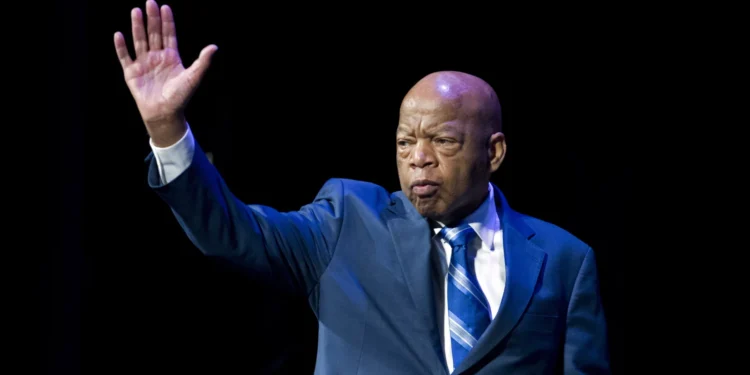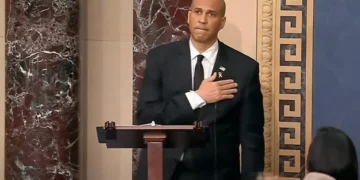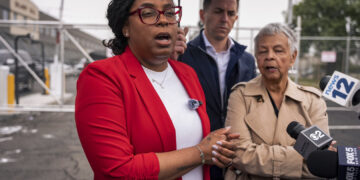July 17, 2025 Story by: Publisher
John Lewis, the son of Alabama sharecroppers, grew into one of the most influential figures of the American civil rights movement. He represented Georgia’s 5th Congressional District from 1987 until his death in 2020, serving more than three decades as one of the most respected voices in the U.S. House of Representatives.
Known as the “conscience of Congress,” Lewis championed civil rights, voting access, healthcare, and social justice. From opposing wars to defending voter rights, he brought moral clarity to every issue he touched—guided by his unwavering commitment to nonviolence and equality for all Americans.
A key figure alongside Martin Luther King Jr., Lewis was the youngest speaker at the 1963 March on Washington and risked his life leading the 1965 march across the Edmund Pettus Bridge in Selma, Alabama — a day remembered as “Bloody Sunday” after police brutally beat peaceful demonstrators demanding voting rights.

Early Life and Rise to Prominence
Born in Troy, Alabama, in 1940, John Robert Lewis grew up in the deeply segregated South. Inspired by Dr. King and the Montgomery Bus Boycott, he became active in the burgeoning civil rights movement as a teenager. In college, Lewis became one of the original 13 Freedom Riders, enduring beatings and arrests as he challenged segregated bus travel across the South.
At just 23, he helped lead the March on Washington, standing on the steps of the Lincoln Memorial with Dr. King and delivering a speech that demanded civil and economic rights for African Americans. He later chaired the Student Nonviolent Coordinating Committee (SNCC), organizing grassroots activism and voter registration campaigns across the South.
Bloody Sunday and Legislative Impact
Perhaps no moment defined Lewis more than his role in the 1965 Selma to Montgomery march. As Lewis led more than 600 protesters across the Edmund Pettus Bridge, Alabama state troopers attacked them with nightsticks and tear gas. Lewis’s skull was fractured in the assault — an image that galvanized public opinion and helped lead to the passage of the Voting Rights Act of 1965.
Lewis’s legacy in voting rights would continue throughout his life. As a member of Congress, he regularly pressed for reauthorization of the landmark law and fought efforts to undermine it. His signature legislation included provisions to expand voter access and protect marginalized communities.
John Lewis was a lifelong and fearless advocate for voting rights, dedicating much of his activism and legislative work to ensuring equal access to the ballot box for all Americans. As a young leader in the civil rights movement, he helped organize voter registration drives and was brutally attacked by police during the 1965 Selma-to-Montgomery march, an event that catalyzed the passage of the Voting Rights Act of 1965.
In Congress, Lewis consistently fought to renew and strengthen that law, often warning that efforts to suppress voter participation threatened the very core of democracy. His signature call to make “good trouble” became a rallying cry for civic participation, especially among young voters and marginalized communities. Through speeches, legislation, and persistent moral leadership, Lewis worked tirelessly to protect the sacred right to vote.

Photo caption: In this July 2, 1963, file photo, six leaders of the nation’s largest black civil rights organizations pose at the Roosevelt Hotel in New York. From left, are: John Lewis, chairman Student Non-Violence Coordinating Committee; Whitney Young, national director, Urban League; A. Philip Randolph, president of the Negro American Labor Council; Martin Luther King Jr., president Southern Christian Leadership Conference; James Farmer, Congress of Racial Equality director; and Roy Wilkins, executive secretary, National Association for the Advancement of Colored People. (AP Photo/Harry Harris, File)
Life in Congress
Elected to Congress in 1987 to represent Georgia’s 5th District, Lewis served for 17 terms. On Capitol Hill, he earned bipartisan respect for his moral clarity and unwavering dedication to justice. He opposed the Iraq War, advocated for LGBTQ+ rights, and fought for health care reform.
Despite his status, Lewis remained a man of the people — frequently spotted at protests, rallies, and public schools, encouraging “good trouble” as a mantra for resistance and civic engagement.

Legacy and Tributes
In his final message to the nation, civil rights icon John Lewis urged Americans to continue the fight for justice with boldness and compassion. Published posthumously, Lewis’s words reminded the public that “ordinary people with extraordinary vision can redeem the soul of America.” He encouraged future generations to stand up, speak out, and get in “good trouble, necessary trouble” to move the country toward equality. His farewell was not just a reflection on his life’s work but a clarion call for moral courage and civic action in the ongoing pursuit of a more perfect union.
Source: NPR

















